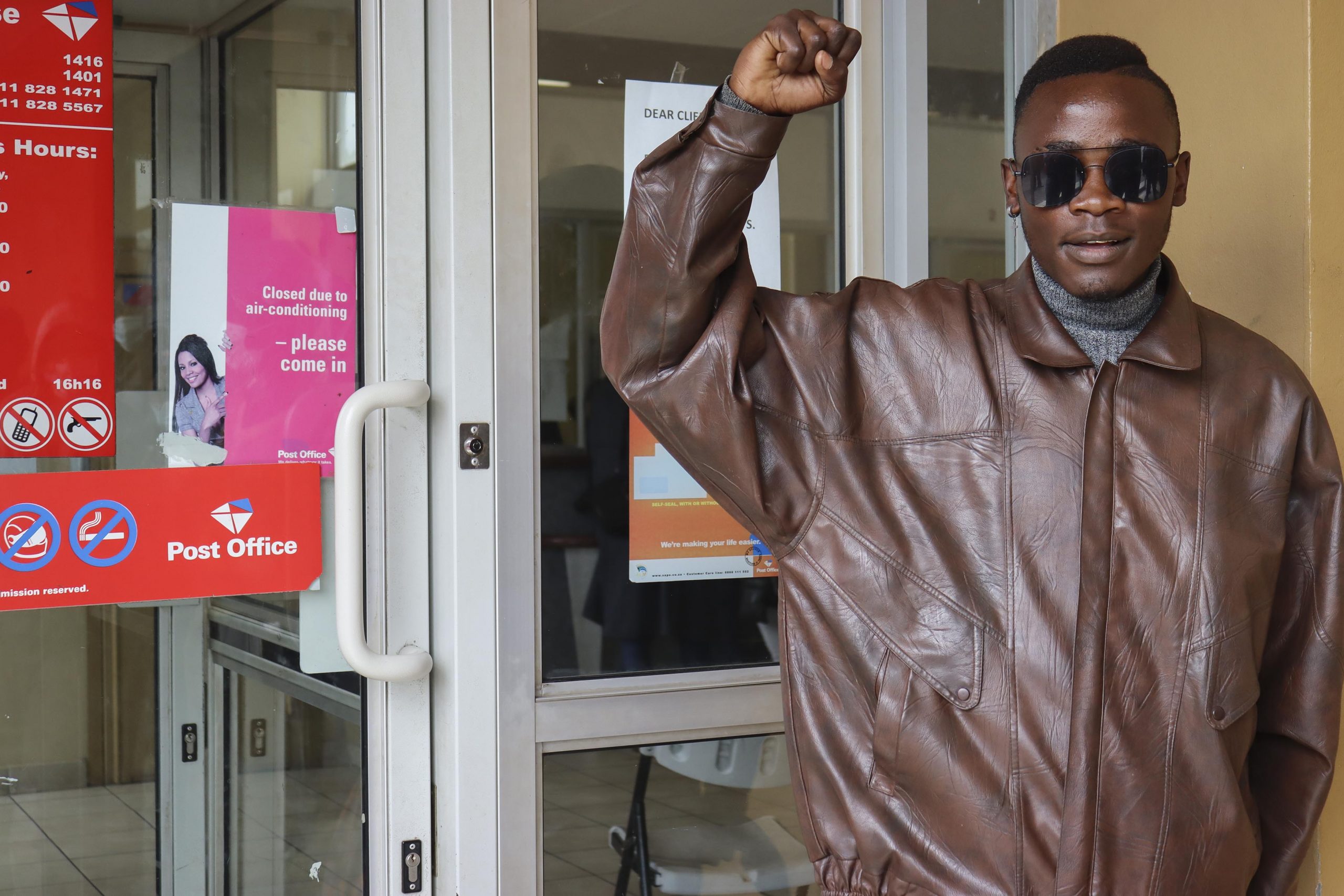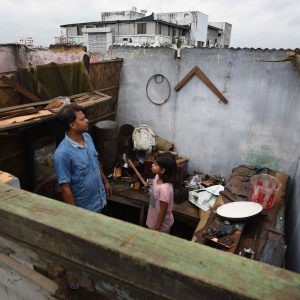Renewed calls for SA to have a basic income grant
Human rights organisations are advocating a state safety net for the millions of South Africans who have been left hungry after the R350 social relief of distress grant was discontinued on 30 April…
Author:
20 May 2021

A winding queue stretched outside the Primrose post office in Germiston on the morning of Friday 30 April as many braved the cold to collect the social relief of distress grant. By mid-afternoon, only a few had received their money. Most were told to come back in two weeks to collect what could be their last payment of the grant, which was discontinued that Friday.
The voices calling for the extension of the R350 grant have risen to a chorus, with human rights organisation the Black Sash saying it should continue to be paid out until the government institutes a basic income grant.
“What is being done in South Africa during this pandemic is not something we [understand],” says Musa Sefala, 22. “R350 is not money. It’s not money, sister … We don’t know what we will live with. It’s better to wake up at 4am with the hope of receiving R350 but if it’s no longer there, what does that mean? We must go and hustle. Where can you hustle when there are no jobs? I don’t work. There are no jobs … if we had jobs, we wouldn’t even need this R350. If they were giving us jobs, it would be fine they were cancelling the R350.”
Related article:
On 6 May, the South African Social Security Agency (Sassa) said all approved beneficiaries would still be paid out despite the dissolution of the grant, but that the payment would “not necessarily come as a double payment/lump sum or on the same day”. Anticipating that the payments would take days or even weeks to be released, the Black Sash issued a statement on 10 May saying the delay would fuel a humanitarian crisis.
“You can go to college, everywhere, we are sitting and we have no jobs … I leave the post office now, and that money is already finished,” says Sefala. “I buy a 12.5kg of maize meal and I am already left with peanuts. What meat can I buy with what’s left? Do you not eat bread every morning? R350 does not cover all three meals daily.”

According to the Household Affordability Index published on 29 April, maize meal is often bought first. It costs R247.46 for 30kg, an increase of R34.79 between September 2020 and April 2021. The report also shows that 25 loaves of white bread cost R331.75. The R350 grant was well below the food poverty line amount of R585, below which 13.8 million South Africans (or 25.2% of the population) live.
Nonetheless, Amanda Rinquest, national education and training manager at the Black Sash, says the grant made a crucial difference. “The R350 grant as little as it is – and it is too little – is fundamentally the difference between someone going to bed starving or not starving in South Africa, and so we must realise that the prevention of a humanitarian crisis is its second role.”
Staving off hunger
Unless you are disabled, the state will give you no support between the ages of 18 and 60, regardless of how dire your circumstances may be. Many human rights organisations argue that extending the social relief of distress grant will provide a small safety net for those affected by South Africa’s rampant unemployment and inequality.
This has brought attention back to the basic income grant, which was meant to be part of the government’s broader social security reforms but has been passed around as “continued discussions” for years.
Director of development consultancy Jasoro Consulting Tessa Dooms says the basic income grant, which the ruling party has resisted for a long time, needs to be seen as a cash investment into the country because the money will circulate in the local economy.
“It needs to be something that we ingrain into the system the way we do basic education. It should be that in a civilised democratic country, basic social protection, in the same way as basic education, is a right that people have. People should not have to be economically active in order to stave off hunger,” says Dooms.
Related article:
Percy Madamalala, 29, arrived at 6am on 5 May, and by midday had still not entered the Primrose post office. She was retrenched from a potato chip company in Edenvale when Covid-19 began to spread. An estimated 2.6 million South Africans have lost their jobs since the pandemic hit.
Madamalala, who has one child, applied for the grant last year, but was declined and approved only in January. She has not received her grant since February and was told her March money hadn’t yet come in.
“I pay my R250 rent and then I am left with R100. Can you apply for a job with R100, sisi? I don’t want to lie, the money has helped me. Today I need to buy as much as I can for next month since last week was the last day. We would’ve appreciated receiving the money on time because we didn’t,” she says.
Sefala says he did not celebrate Freedom Day on 27 April. “There is no freedom in South Africa. Freedom is a lie … There is no hope for you if you are a Black person in Mzansi. Freedom is for white people. Why are we the only ones who are struggling? Why do we only see three white people in these grant queues? Yes, we are the majority, but why is the minority always in a good position? In the squatter camps, it’s mainly Black people. There are no white people in the squatter camp and if you find one there, he is there because [he wants to buy] drugs, nothing else.”
More people need to be employed at the post office to accommodate the foot traffic when grants are paid out, he says. “When two people are working and one person comes in to do their licence, one person is serving you. If five people come in, then we must wait for all of them to be served and how much time is that? [People] haven’t bathed or eaten since this morning and yet there are two people working … then they also cut us off after 100 people. That means number 102 slept on an empty stomach yesterday and even today you want him to go home without eating again? We need at least six people working here so the queue can go faster. Look at us now, there are over 200 of us here, when will we finish?”

He was fortunate to get his money. Those cut off on 30 April came back on 11 and 14 May. Some, like Buyisile Mlambo, 44, who were turned back in April, expected double payment in May but did not receive it. She wanted paraffin, groceries and to pay back a mashonisa (money lender) after borrowing money for transport to three grant offices.
Like many in the queue, Mlambo didn’t understand the number system and arrived on the day set aside for those with numbers 087. Hers was 084. She arrived after midday after starting off in Edenvale where she was told her number would be paid out the following week. “I thought maybe I would try this office because I am desperate, and I am only hearing now that the last day was last week. They use the same system as the other offices.”
Weaving sentences through an incessant cough, Mlambo explains that the money has helped her get to a clinic and buy her youngest son a school uniform. She has not worked for a while, but is sometimes fortunate enough to work a piece job in Randburg that pays R350. She was eventually paid R700 of her grant on 14 May.
‘This is not fair’
Siphokazi Ntileka, 20, is doing grade 11 at an ABET school in Makause, Ekurhuleni. “I want to use the money for things for school – for books, a calculator. I need to use the internet to do research for school, and I don’t have a smartphone,” she says. This is her first time receiving a grant. An uncle encouraged her to apply, even if it is for the last payment. She wanted to try last year but had to save up to get money for an identity document.
A woman sitting on a bench says she wants to remain anonymous. She is back for the second time. “This will affect votes because the ones who they don’t recognise, the ones who are sitting and not working are the ones who vote the most. Those who have money, they don’t care. People are suffering all over, in the informal settlements, and there are no jobs, so old people are relying on their children’s R350s … Even those food parcels, people didn’t get them.
“[The ANC is] eating money … they are driving posh cars. Look at the young men standing here. Look how young he is and he doesn’t work. Where will he get a job? His future? When will he get married? What will he have? When will he own a home? This is not fair. These boys are young. It’s not nice,” she says.
Related article:
Themba Zwane, 20, says his first priority is to pay back the debts he incurred during the month and adds that as the cost of living increases, the grant should be increased. “As long as there is Covid, the money shouldn’t stop. Because now Covid has closed channels, you can’t even go anywhere without a mask. I can’t even afford that. At least with that R350 I can buy it and use it where I need it … or buy soap to wash an old one or one I pick up,” he says.
He refers to himself as a “grant baby” having been a child-grant beneficiary. After turning 18, Zwane didn’t have to go long without financial aid from the state as the social relief of distress grant was introduced shortly afterwards, albeit temporarily.

During the months in limbo, Zwane sold marijuana but was afraid of getting caught and losing any prospects of getting a job. With this last R350, he is going to buy bulk cigarettes he can sell. He says he is a “sophisticated man with a plan”.
“[It’s] so I don’t go backwards, so I can at least have some income once they stop giving me theirs. Maybe my profit can be that R350,” he says. “What was helping you is no longer there and that messes you up sometimes, so what do you do? You take the easy way. Selling a battery gives you R400 in an hour and half rather than queueing and that’s why you’ll find the crime rate high in SA,” he smiles, flashing his gold teeth. “This is the kind of stuff that makes people lose focus on their ultimate goals. Their priority is just to eat.”



